- Home
- Claire Legrand
The Cavendish Home for Boys and Girls Page 7
The Cavendish Home for Boys and Girls Read online
Page 7
She searched for a long time and found nothing helpful, even years and years back. Then she went back even farther. Missing children bulletins. Letters to the editor about such-and-such. Advertisements: THE CAVENDISH HOME FOR BOYS AND GIRLS IS HOSTING A FIELD DAY FOR ALL AREA CHILDREN THIS SATURDAY, APRIL 14. BEETLE-B-GONE EXTERMINATION OFFERS FREE CONSULTATIONS.
None of this meant anything. They were random pieces of many different puzzles.
In these old papers, Victoria saw the construction of the Academy, her street, and the streets around it.
The Bulletin’s oldest issues were on microfilm. Victoria found the right cabinet on the wall. She thumbed through the tiny pockets of film, took out the first Bulletin one, put her hand on one of the microfilm readers to turn it on—
Behind her, the door opened.
The white light of the library illuminated a dark figure.
Victoria reached for her umbrella but couldn’t find it. She had left it beside the computer.
“What do you want?” she said, trying to sound brave.
The door shut. The figure melted into the room’s darkness.
“Miss Wright?” said a voice.
“Professor Alban?” said Victoria. She squinted and saw the frazzled hair. In the computer’s glow, his glasses blinked white.
“Are you—” said Professor Alban. He opened the door a bit, peered outside, shut it, and wedged a chair beneath the doorknob. “Why are you here?”
Victoria backed away. “What are you doing with that chair?”
“They’ve caught on to me, I think. I don’t have much time. This might be the last time I can come here.”
“Who’s they?”
Professor Alban took off his glasses to clean them. Victoria heard the lenses break.
“I don’t really know,” he said. “But people—things—have been following me, ever since I started looking around, searching through files at the Academy, town hall, here. At least, I think something’s following me. I can’t be sure.” He wiped his face. “Why are you here, Miss Wright?”
“I’m writing a paper,” said Victoria. She hid the microfilm behind her and wished she had closed the drawer.
“You’re here because of the missing children, aren’t you?” whispered Professor Alban. “I noticed it a few weeks ago. There’s a dozen gone by now. I should have noticed sooner, but I’m only just now getting settled, you know. I’ve only been here a couple of months.”
Victoria felt more afraid than she had since this whole thing began. What, exactly, was Professor Alban trying to say?
She said, “I don’t know what you’re talking about,” and was pleased to hear how crisp and cool her voice sounded.
“Miss Hennessey. Mr. O’Flaherty.” Professor Alban paused. “Mr. Prewitt.”
Lawrence. His name stuck in Victoria’s throat, and an unfamiliar pang ripped through her chest. Professor Alban had included Lawrence’s name with Jacqueline’s and Donovan’s. He’d said it out loud. Were they really all gone together somewhere, like Victoria had wondered but never wanted to believe? For the first time in her life, she wished she had been wrong. She didn’t know what to say.
“Yes, I’ve noticed that they’re gone, too,” said Professor Alban, moving to the computer. He leaned over to read the screen. He read. He looked up.
“The Home,” he said. “Mrs. Cavendish’s Home.”
Victoria gritted her teeth. “And?”
“I think I can trust you,” said Professor Alban. “You’ve always been a good student. And I know Mr. Prewitt was your friend.”
“Is my friend.”
Professor Alban’s face was bleary and sad in the computer light. “Yes, of course. What do you have behind your back?”
Victoria didn’t move. “Weird things are happening around here.”
“Yes.”
“How do I know you don’t have roaches up your sleeves or something, like Professor Carroll?”
“Roaches?” said Professor Alban. “What do you mean, roaches?”
Victoria tapped her fingers on the microfilm. Professor Alban had always been one of the good ones, one of those professors who actually did things. He made them work.
She decided to trust him and held out the packet. “I was looking at this. The Belleville Bulletin.”
Professor Alban sighed. “That’s what I’ve been looking for, every time I come here. Something’s been keeping it from me, though. I look in the right spot, but it isn’t where it should be. I don’t understand it. It’s like someone’s playing a game with me.” He laughed sadly. “You know, sometimes I can hardly remember what I’m looking for anymore. I have such a hard time remembering what they looked like. Sometimes I forget they were ever there.”
“Lawrence has black hair with a lot of gray hairs, too,” blurted Victoria, clenching her fists. “And he’s got gray eyes, and he hums when he’s happy.”
Professor Alban stared at her. “Yes . . . yes, I remember now . . .”
Victoria heard a scuttling near her, and also farther away in the walls, behind the cabinets, underneath tables. A patch of dark approached her.
She put on a dazzle, lifted her boot, and stomped the dark patch once it was close enough. It squished and crackled, and the stink filled the room. Victoria heard a tiny, furious scream like from a tiny pocket person or from somewhere far away.
The other scuttlings rushed away to the corners of the room and fell silent.
Professor Alban got to his feet. “What was that?”
“One of those roaches. There are lots of them. I’ve seen them all over.” Victoria patrolled the room, glaring into the shadows for more things to stomp. “They’re evil or something, I think. They’ve got ten legs, and they pinch you with them. I saw some under the papers on Professor Carroll’s desk. Well, I saw feelers. But you know. I saw one at Lawrence’s house, too.” Victoria scraped the bottom of her boot against the floor, but her boot was clean. All the guts and crushed feelers were gone. It was like there had never been a bug at all.
“I don’t know what they mean yet, but they’re something,” said Victoria.
“Well,” said Professor Alban. He crossed his arms over himself like he was very small. “I don’t know how much time we’ve got.”
“Is someone going to come after us?”
Professor Alban shrank even farther into his own arms. “I think so.”
“But who?”
“I’m not sure. It’s so hard to think.” Professor Alban pulled at his collar. His eyes looked funny. “Shadows. Dark things. I haven’t been sleeping. Eyes in the walls.”
“I was searching the newspapers,” said Victoria slowly, forcing herself to focus. Eyes in the walls. Were there eyes in these walls, watching them even now? “I want to learn about the Home. It’s strange, right? I have a bad feeling about it, and I don’t usually have bad feelings about things.”
Professor Alban adjusted his glasses. “How so?”
“Well, there’s Mr. Alice. He’s the gardener. He has weird, twitchy eyes, and his skin is all bulgy and swollen, but the Prewitts and Professor Carroll, they have weird, still eyes now. They don’t even look real, they’re so bright and happy. And Mr. Waxman, too. They’re always smiling really big, too big.” She paused to think about that. “I went to the Home, you know. I was looking for Lawrence, and when I went there, it all looked nice, and Mrs. Cavendish gave me some candies. But it felt weird. You know, that in the middle feeling? It’s hard to put into words, but you know something’s off all the same.”
“I think I know what you mean,” said Professor Alban. “Go on.”
Victoria began to pace. “And all the missing kids. I wonder if there are others. In Grandville and Uptown. And maybe there have been weird bugs before. And look at this.”
Professor Alban stared at the unfolded paper plane in Victoria’s hand and the scrawled plea for help.
“I took this when I went to the Home yesterday,” Victoria whispered. The air around them se
emed suddenly quieter. “Someone wanted me to see this.”
Professor Alban kept looking back at the door. He wiped the sweat from his face.
“We should keep looking,” he said. “Put that away. Please.”
Victoria did, and they kept searching, through one hundred issues of the Belleville Bulletin. Sometimes pieces of the film were blacked out with scribbly marks, burned away, or cut away.
The last issue they looked at was from so long ago that Belleville was little more than Town Square and farms.
Next to an advertisement for A. C. Sherman’s Feed Store was another advertisement, so tiny that Victoria almost missed it.
“Wait,” said Professor Alban, pointing at the reader. The hot yellow light made his tired face look gravely ill. “There.”
A little square said, NEW RESIDENT BUILDS CHILDREN’S HOME and THE CAVENDISH HOME FOR BOYS AND GIRLS and CONSTRUCTION and other things, but black blobs smudged the print. The smears covered almost everything, including the photograph of the Home itself. Victoria could only see the chimneys.
“Is that . . . ?” she said, leaning closer.
At the front of the photograph stood two figures—a woman in a white dress, and a man in dark work clothes. The man carried a rake. The woman stood with hands clasped at her waist. Smudges blocked their faces and most of their bodies, but Victoria could see enough. One familiar bright eye stared back at her from the woman’s face.
Cold ran down Victoria’s arms, but it wasn’t the strange coldness from before. It was the coldness of understanding something awful.
“It looks just like her,” she said, pointing. “Like Mrs. Cavendish. And that’s Mr. Alice. It has to be. But there . . . how is this possible . . . ?”
Victoria pointed at the faded date near the top of the page.
“That’s over a hundred and fifty years ago,” whispered Professor Alban.
“Well, those people in the picture have to be their—their ancestors or something,” said Victoria, backing away from the table. “Maybe her great-great-grandmother. And Mr. Alice, his great-great grandfather. Right?”
“Maybe ownership of the Home got passed down through their families,” said Professor Alban, but he didn’t look like he believed that.
Victoria couldn’t stop staring at the two smudged figures.
“If it is them,” she said, not wanting to say it, but knowing she must, “if those people in the picture are our Mrs. Cavendish and our Mr. Alice . . . how could they still be alive?”
She and Professor Alban stared at each other, the horrible question floating between them.
Bang.
Something slammed into the door. It slammed again and again, louder and louder.
Bang.
Bang.
“They’re coming for me,” said Professor Alban. He grabbed Victoria and shoved her into the corner farthest from the door. “The shadows. The eyes in the wall. They’re coming.”
Victoria rubbed her arms. They hurt where Professor Alban had pinched them. She stared at him as he backed away from the door.
“What do you mean?” she said.
Professor Alban didn’t answer. He backed into a table and fell into a chair that was suddenly too big for him. He looked like a child drowning in grown-up clothes, frightened and shaking.
Victoria moved toward him.
“No,” he whispered. An outstretched hand stopped her. “Hide. Hide.”
The only sounds Victoria could hear were the slamming door and her own heartbeat. They began to match up. Her heart was the slamming door.
She shrank back into the corner and put her hands over her ears. The slams kept going, rattling the walls, making the white light around the door pop in and out, closer and closer . . .
Darkness shadowed the frosted glass.
Two dark streams of . . . something . . . slipped through the white light from outside into the Records Room. They disappeared into the shadows of the wall. More dark streams joined them from underneath tables and behind cabinets. The room crawled.
Scuttling sounded from everywhere. Cold seeped in through the white-ringed door, toward Victoria’s toes.
The scuttling grew louder. Victoria peeked through her fingers at her arms. They were bare and whole, but she felt like something was there, scratching her, trying to wind her up into evil knots.
She heard the horrible sound of a very small boy whimpering in terror.
It was Professor Alban.
Victoria dared to look up and saw the dark streams converging on the chair where he sat, sliding around his legs, clicking and swarming and waving their feelers all over him.
The door slammed open at last, into the wall.
Victoria hid her face. She heard heavy, scratching, dragging sounds. Professor Alban started to scream. Victoria pressed her hands to her ears, squeezed her eyes shut, and recited French to occupy her brain.
Crier. To scream.
Je crie. I scream. Tu cries. You scream.
Il crie.
He screams.
Silence. Silence. That was the same.
The door closed, and after several minutes, Victoria forced herself to look up.
The cold dark of the Records Room returned. The microfilm reader buzzed its yellow light.
Professor Alban’s chair was empty.
Victoria came out of her corner to investigate. The strange noises and dark, scuttling things were gone, the cabinets closed, the microfilm put away. Victoria tried to open the cabinets but couldn’t.
She grabbed her things and snapped everything closed like she was getting ready for school, like it was any other day.
“I don’t know what I saw,” she said, over and over. “Nothing happened. It’s fine.”
But it wasn’t fine. She had seen and heard something awful, and now Professor Alban was gone.
There was only one thing to do, Victoria realized as she stared at the now-quiet door.
Run.
She lunged for the door and yanked it open. Dashing out into the white, clean library, she realized she was alone. All the people were gone. She almost began to cry at the thought of being forever locked in a library of black bugs and white lights, but she was running too fast to cry.
She made it to the exit. It wasn’t locked. As she ran out onto the steps, Mr. Waxman, standing alone at the front desk, called out, “Come back soon, Victoria.”
Town Square was just as busy as ever, like nothing at all had happened in the library. The people gleamed and twirled and smiled, everything silver, everything sharp.
Victoria pushed her way into the neighborhoods just beyond Town Square, through streets of grim black gates, hedges shining with rain, clean houses and clean shutters, and every now and then a red warning notice in a yard with grass an inch too tall. She ran all the way to Silldie Place. The cobbled walks were so slick with rain that she could see her reflection in the stone—a pale ghost flying in a raincoat.
She stopped at home only long enough to root through her father’s impeccably ordered shelves in the garage. Someone was calling her name from the kitchen, but she ignored whoever it was, muttering, “Where is it, where is it?” until she found it—a can of bug spray.
“Victoria?” It was her mother from just inside, near the kitchen, and for the first time since she was very small, Victoria wanted her mother. She wanted to hide. She wanted to admit failure. The door leading into the house was so close. If she just reached out a little bit, she could grab the doorknob. . . .
But her grip on the cold metal can kept her from going inside. She could not hide; she had to find Lawrence. The image of her favorite street sign popped into her head: VICTORY. Victoria Wright did not admit failure.
Shoving the spray can under her raincoat, she slipped back outside into the damp afternoon, running past Five and Seven on one side and Four, Six, and Eight on the other. She was too frightened to stop, too desperate to understand what she had seen in the library. It wouldn’t happen to Lawrence, it won’t, it w
on’t, she repeated to herself with each step.
Nine Silldie Place: the gray wall, the bright flowerbeds, the dark nameplate. The Home’s gate stood open, and once Victoria ran inside, it closed with a heavy, metallic click.
She wanted to turn back, climb over it, and get away. But she couldn’t forget Professor Alban and all the evil, dark things swarming on him. She couldn’t forget the slamming door, the empty library, the smudged pictures of Mrs. Cavendish and Mr. Alice.
Maybe it wasn’t them, though. Maybe Victoria had gotten a little silly with all this.
But if it was them . . .
She had to know. She had to see this place for herself. Maybe, if she got a good look at the inside, and at Mrs. Cavendish, she would have a better idea of what to do next. It could help her figure out what happened to Professor Alban. She would have to be careful, she would have to sneak around and remain unseen, but if she could manage it, if she could find out more in person about the Home . . .
It could help her find Lawrence before he got snatched away for good too. She didn’t want to imagine hearing Lawrence screaming, but it happened anyway. She imagined him crawling with roaches too and screaming and crying like Professor Alban had, and no matter how hard she tried, Victoria couldn’t get to him.
At the front of the house, wide steps led up to the porch and the front door, but Victoria avoided that and slunk around the right-hand side of the Home, pressing close to the gray brick walls. She slipped a hand under her raincoat and withdrew the spray can.
“Just try and come at me, stupid bugs,” she said. “See what happens if you do.”
Every few steps, Victoria paused to listen for signs of life, but she heard nothing except the wind in the trees, rustling and snapping. Ahead, past the corner of the Home, flower bushes and shrubberies and stone paths stretched across the grounds. Gardens.
I can start there, Victoria thought. Maybe someone’s outside to spy on.
She crept forward, paused, crept forward again, and took a step around the corner—
—right into Mr. Alice’s stomach.
“Uh-oh,” he said, smiling down at her. In one hand, he held an enormous shovel with dirt and rot clinging to it.
“I—I—” said Victoria, staggering back. She tried to say something, anything, but her throat was too tight for words. A dark movement across the ground caught her eye—a roach, scuttling out from behind Mr. Alice to squeeze into a hole in the brick.

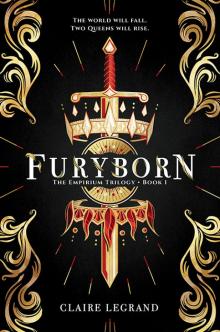 Furyborn
Furyborn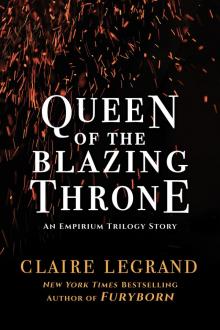 Queen of the Blazing Throne
Queen of the Blazing Throne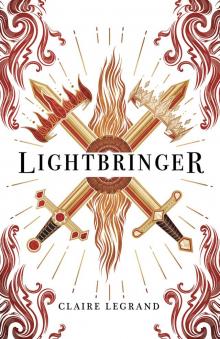 Lightbringer
Lightbringer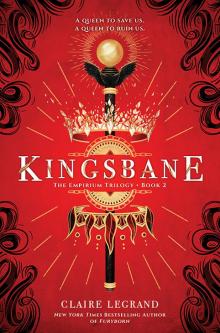 Kingsbane
Kingsbane Cavendish Home for Boys and Girls
Cavendish Home for Boys and Girls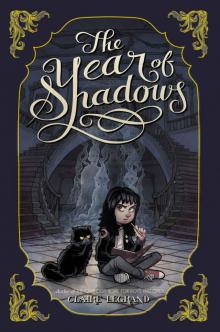 The Year of Shadows
The Year of Shadows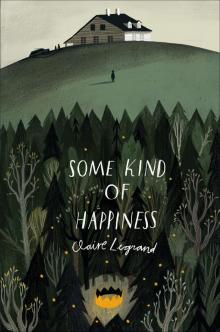 Some Kind of Happiness
Some Kind of Happiness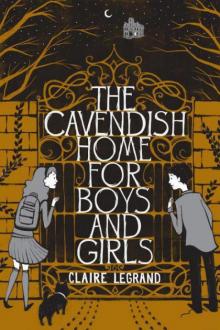 The Cavendish Home for Boys and Girls
The Cavendish Home for Boys and Girls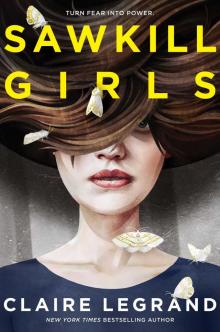 Sawkill Girls
Sawkill Girls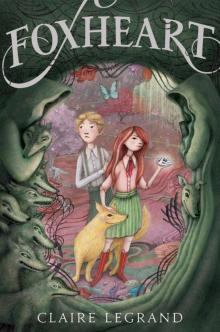 Foxheart
Foxheart Summerfall: A Winterspell Novella
Summerfall: A Winterspell Novella